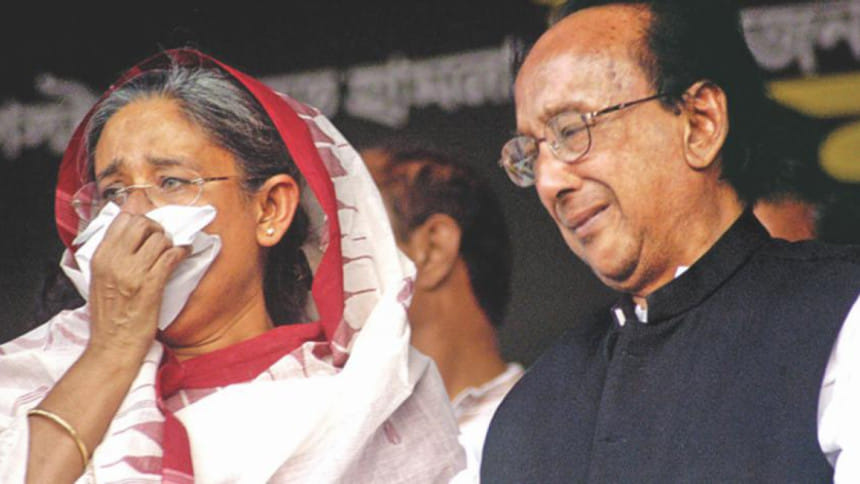The tragedy of 21st August

As the nation observes the 12th anniversary of the ghastly grenade assault that was carried out at an Awami League rally in Dhaka city on August 21, 2004, discerning observers have to agree that the horrendous crimes committed on that day has left an indelible impact on the course and character of constitutional politics of Bangladesh. Dismal thoughts would surely occupy the minds of sane Bangladeshis when they venture to think of the deadly destruction and carnage of August 21, 2004. It was on that day the nation witnessed an unprecedented diabolic attempt to wipe out the major leaders of a political party. Our double jeopardy was that a most unfortunate and condemnable criminal incident was followed by a callous and slipshod investigation that only enraged the public.
The criminal case in question has been further investigated and important points need to be clarified. There is allegation of establishment complicity in the gory killing and maiming. Top enforcement officials who have been booked in the case have to prove that they did not have any criminal intention in their alleged failings. The important question, however, is that whether the dastardly offence was politically designed and executed through foot soldiers. We will have to wait for the investigation and the conclusion of the trial to find answers of many unresolved queries.
To recollect, the multiple grenade assault of that day, was clearly a manifest attempt to wipe out the entire leadership of the mainstream political party. The damage already caused with its far-reaching ramifications cannot be brushed aside. The double figure deaths and crippling injuries of hundreds should make us wonder if the state organs investigating the incident and the then political authority realised the enormity of the dastardly attack.
We may also recollect that the investigation of the above incident was not taken in right earnest that it deserved and the first indication of that was the unpardonable failure to protect and preserve the scene of occurrence. There was allegation that physical evidence was tampered with and destroyed. The field units did not act with desired speed and circumspection. The question is, did this happen because of a so-called instruction from above? The culpability of all concerned, high and low, needs to be established.
While extreme views advocating annihilation of the political opponent has been a sad socio-political reality of our society, there is a paramount need to stop it once and for all. Many political murders have not been investigated properly, while some cases are still under investigation and some have been perfunctorily looked into. Such a state of affairs point to the supreme necessity of a comprehensive investigation of the incident of attempted assassination of Sheikh Hasina, because that is expected to be an example-setter in the criminal justice system.
In Bangladesh we need to seriously acknowledge the significance of authoritative approval or condoning of violence because such action is construed as social approval. The so-called political circumstances have often obstructed accountability of the culpable individuals. There is good reason to doubt that a considerable number of officials abnegated their responsibility to protect all citizens regardless of their identity.
Quite often, the disconcerting socio-political reality is that the source of deterioration in crime and order situations originated in the continuing patronage of criminals and bullies. Practically, what the people see is the end result of a cumulative process of patronised crime.
The premonition is that if criminals continue to enjoy immunity from law enforcement then we have a systemic crisis at hand, and a serious one at that. The manifestation of that crisis relates to the allegation of selective law enforcement scenario wherein state functionaries hesitate to enforce the law, suo moto.
The suspicion is that the systemic deficiency is located within the political parties and machinery of law enforcement. The desired corrective actions cannot be unilaterally taken and quite distinctly calls for a politically bipartisan approach with active involvement of the civil society. At the same time, demobilisation of criminal elements has to be agreed on by all political stakeholders. The remedy lies in cleaning our politics through decriminalisation, supported by apolitical and impartial law enforcement.
The writer is a columnist of The Daily Star.

 For all latest news, follow The Daily Star's Google News channel.
For all latest news, follow The Daily Star's Google News channel. 



Comments